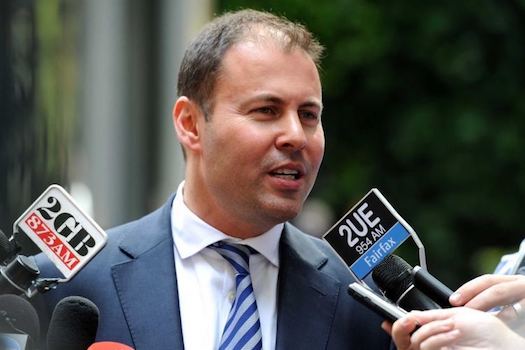Comment from Peter Saxon
Over the weekend at the Liberal Federal Council meeting in Sydney a resolution to sell off the ABC in metro markets was passed by an overwhelming majority of rank and file members.
But their dream of making a historic change to the tenor of public discourse in Australia was quickly shattered by Communication Minister Mitch Fifield and Treasurer Scott Morrison who bluntly told reporters “The government has no plans to privatise the ABC.”
Energy Minister Josh Frydenberg, speaking on Sky News said, “The ABC is an iconic national institution, it provides valuable services to our regions and to our cities, it is not going to be sold and it can never be sold.”
Conservatives expect the national broadcaster to be “fair and balanced” and as Mr Frydenberg acknowledges a perception that it is biased towards the left irritates many of his party’s faithful. “Of course everyone has some frustrations from time to time with the coverage on the ABC and it is important to vent those frustrations and make them known but it is in the public’s hands for a good reason.”
In an article titled, What’s wrong with being ‘fair and balanced’? ABC Editorial Director, Alan Sunderland wrote:
 “Fairness” and “balance” are not and never have been recognised standards of objective journalism. They can be helpful indicators of impartiality and accuracy, but only if they are put in the right context and used wisely. In other words, if something is ‘accurate and impartial’ it will always meet the recognised standards of objective journalism. If it is fair and balanced, it might not.
“Fairness” and “balance” are not and never have been recognised standards of objective journalism. They can be helpful indicators of impartiality and accuracy, but only if they are put in the right context and used wisely. In other words, if something is ‘accurate and impartial’ it will always meet the recognised standards of objective journalism. If it is fair and balanced, it might not.
“A simple example will suffice. If I write a story that says a doctor wants to vaccinate a child at risk of whooping cough to protect her from harm but the child’s mother is refusing because the vaccination will do more harm than good, I have produced a piece of writing that is fair to both sides and entirely balanced.
But it is a long way from being responsible journalism.”
Conservative voters remain unconvinced. Despite, for example, Q&A’s apparent transparency showing the numerical balance of the studio audience’s political leanings, conservatives feel that the ideological makeup of the show is constantly stacked against them.
They feel that panelists who hold conservative views on issues such as climate change, immigration or same sex marriage, even if given equal time, are not given the same courtesy afforded their progressive counterparts.
While ABC bias is a bread butter issue with outlets such as 2GB, The Herald Sun and The Australian, most readers’ posts and talkback callers accept (even if grudgingly) that left leaning media has a right to exist in a democracy. They just resent having to pay taxes to support it. Hence the ongoing calls to defund or sell-off the ABC or, at the very least, rein it in.
There are a number of reasons why that will never happen.
Firstly, existing owners, led by conservative media would be dead against it. Their presenters may rail against the ABC on air and amplify listener anger but the last thing the owners need is a privatised, commercialised competitor that would easily carve around 20 per cent out of available advertising revenue in the national market as well as each of the local ones.
Secondly, a privatised ABC would have to compete for audience in the same way as any other commercial station, which would compel it to provide more programs that are popular rather than appealing to esoteric tastes not catered for by the mainstream. This could mean more lifestyle and reality shows and less women’s sports and, most likely, less news and current affairs which would inevitably be dumbed down to reduce costs.
On the other hand, everyday listeners and viewers who hope that a privatised ABC would be less biased are likely to be disappointed. Lefties buy toilet paper and motor cars the same as conservatives do and any new owner would be far more interested in the ABC’s ability to deliver a large, well targeted audience than to push a political barrow.
Listeners who don’t work in media could be forgiven for being unaware that a conservative talk format is simply a programming decision to fill a void in the marketplace in the same way a music station decides to target 18-39’s with CHR or 40-54 females with a modern smooth or easy listening format. It’s all the same to a professional content director. If a conservative talk format is unsuccessful, as was the case with 2UE when it was battling market leader 2GB, that format will be changed based on financial considerations not political ones.
Having said that, the new owners of a privatised ABC could end up in the hands of a consortium headed by a group such as Get-Up financed by a left leaning billionaire such as a George Soros who would not only see the rich financial opportunity that the ABC presents but one that also suits his world view. Such an owner could be of a mind to double down on the ABC’s leanings and deliver a far more aggressive stance than it currently does.
In the end, for all the exuberance of the Young Liberals who backed the motion to sell off Aunty, the hard heads of the party knew that it would be political poison. Within minutes of hearing the news that a motion was passed with a 2-1 majority the leader of the opposition, Bill Shorten, was already incorporating the ‘imminent sale’ into a Labor scare campaign vowing to block it if elected.
Regardless of how some conservative voters feel about the ABC, according to research finding after finding it remains an institution that most Australians find to be valuable and trustworthy.
While all mainstream media of late, including the ABC, has taken a hit to the trust quotient in the minds of consumers, a robust media free of political meddling is still seen as a cornerstone to our democracy – at least here in Australia. A move by any political party hoping to silence the ABC – or any msm outlet, for that matter – by selling it or defunding it would be seen by the majority of Australians as a threat to our freedoms and render that party unelectable to government.

Peter Saxon

